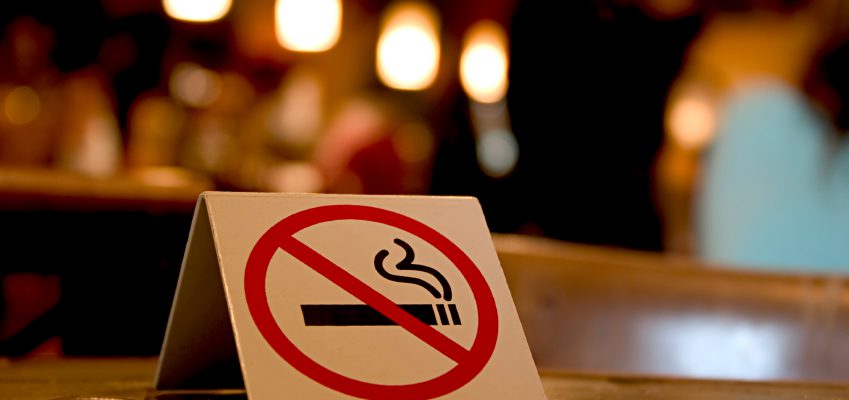Goal Area 2: Eliminating Nonsmokers’ Exposure to Secondhand Smoke
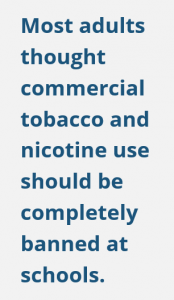 The SUTPP and the CDC share the goal of reducing the health burdens of commercial tobacco or nicotine use by eliminating nonsmokers’ exposure to secondhand smoke.
The SUTPP and the CDC share the goal of reducing the health burdens of commercial tobacco or nicotine use by eliminating nonsmokers’ exposure to secondhand smoke.
Support for Smokefree Indoor Air Policies and Laws
The ATS gathered information regarding Wyoming adults’ opinions on smokefree indoor air policies and laws. Different ATS questions asked about support for policies, rules put in place by individual businesses, and statewide laws. These questions asked about smoking, not vaping.
Support for Smokefree Indoor Air Policies
The ATS items about smokefree indoor air policies asked adults if they think smoking should be allowed indoors at workplaces, restaurants, bars, and casinos and clubs. (Casinos and clubs were combined on the survey, so WYSAC treated them as a single venue type.)
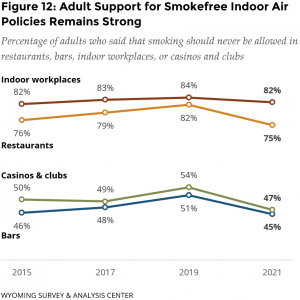
In 2021, most adults (82%; Figure 12) supported smokefree indoor air policies for workplaces. Three-fourths (75%) of adults supported smokefree indoor air policies for restaurants. Slightly less than half (47%) of adults supported smokefree indoor air policies for casinos and clubs. Under half (45%) of adults supported smokefree indoor air policies for bars.
Between 2019 and 2021, support for smokefree indoor air policies for restaurants and casinos and clubs significantly decreased. No other differences between 2019 and 2021 were significant.
Wyoming adults’ support for indoor air policies has remained strong and consistent between 2015 and 2021.
Support for Smokefree Indoor Air Laws
Additional survey questions asked respondents if they support or oppose statewide smokefree indoor air laws in Wyoming for the same venues. Support for smokefree air laws was similar to support for smokefree air policies. Details are in Appendix B: Wyoming 2021 ATS Frequency Tables and Appendix C: Statistical Analysis Methods and Detailed Results.
Support for Other Smokefree Air Policies and Laws
Smokefree Parks Policies
In 2021, four out of five Wyomingites (80%) thought smoking should be restricted at outdoor parks, at least in some manner. This support has remained consistent since 2010. In 2021, 27% of adults thought that smoking should never be allowed, and 53% of adults thought that smoking should be allowed only at some times or in some places.
Smokefree Workplaces Laws
Support for laws making outdoor workplaces smokefree was substantially lower than support for laws making indoor workplaces smokefree: In 2021, only 22% of adults supported a statewide smokefree air law for all outdoor workplaces, compared to 77% for indoor workplaces. The level of support for such a law has not changed significantly since comparable questions were first asked in 2015. There was no question about support for policies against smoking outdoors at work.
Tobacco-Free School Policies
In 2021, most adults (85%) thought commercial tobacco and nicotine use should be completely banned at schools. This support has been consistent since 2010. There was no significant difference of support between adults who were living with a child aged 17 or younger and those adults who were not.
Exposure to Secondhand Smoke
Smoking Regulations at Work
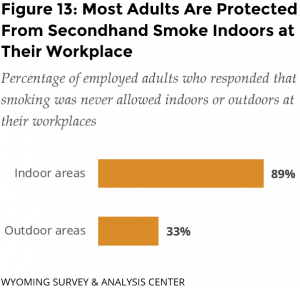
Most employed adults (89%; Figure 13) reported that smoking was never allowed in indoor areas (including inside a vehicle) at their place of work. The question asked since 2019 does not allow direct comparison to earlier data but does not show a dramatic change over time.
About one third (33%) of adults reported that smoking was not allowed in outdoor areas. This has significantly increased since 2012 (25%). There is still a large gap between indoor and outdoor policies at work. Workers are better protected indoors than outdoors at work.
Exposure to Secondhand Smoke at Work and in Public Places
In 2021, most employed adults (82%) were not exposed to secondhand smoke at their workplace. Still, 18% of employed adults reported experiencing secondhand smoke at their workplace either indoors or outdoors. There’s been no significant difference over time between 2010 and 2021.
In 2021, most adults (66%) were not exposed to secondhand smoke in public places, indoors and outdoors. About one third (34%; Figure 14) of adults reported breathing someone else’s secondhand smoke in an indoor or outdoor public place. Almost one third (30%) of adults reported experiencing exposure to secondhand smoke in outdoor public places. Very few (8%) adults reported being exposed to secondhand smoke in indoor public places. Although still a cause for concern, exposure to secondhand smoke has significantly decreased in public places, indoors and outdoors, between 2012 and 2021.
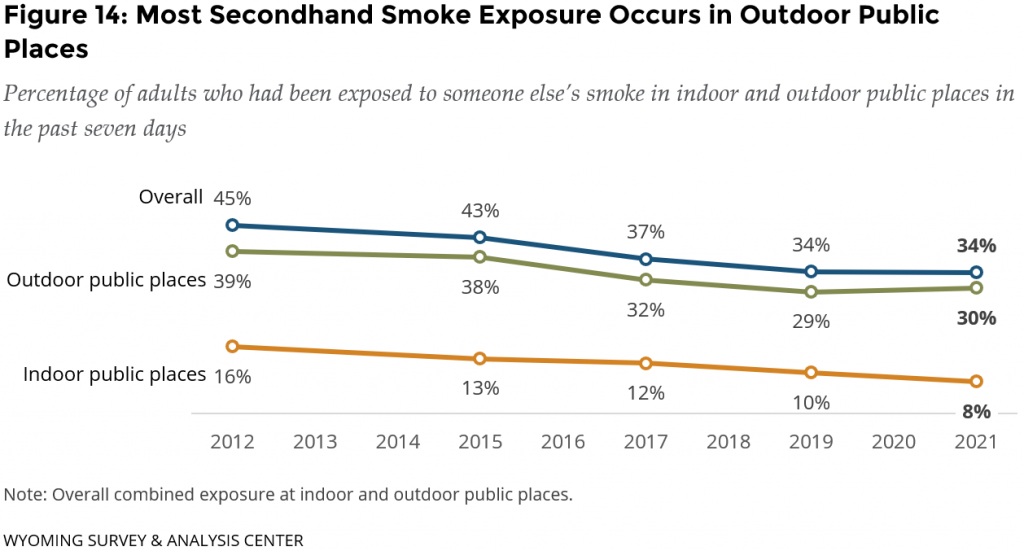
In 2021, the chances of being exposed to secondhand smoke while in a public place were not significantly different between current smokers and nonsmokers:
- 42% of current smokers reported exposure to secondhand smoke.
- 32% of nonsmokers reported exposure to secondhand smoke.
Opinions about Harmfulness of Secondhand Smoke
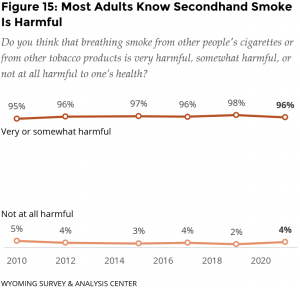
Over the years, adults have almost unanimously agreed that breathing someone else’s secondhand smoke is harmful to one’s health (Figure 15). In 2021, the majority (96%) believed secondhand smoke was very or somewhat harmful to one’s health. Only 4% believed that it was not harmful. These levels of agreement have not changed significantly over time between 2010 and 2021.
Conclusions
Over the years, exposure to secondhand smoke has significantly decreased in public places, indoors and outdoors. Two-thirds of adults reported that they were not exposed to secondhand smoke in public places, indoors or outdoors.
Adults have shown consistent and strong support for indoor air policies for workplaces and restaurants. Most adults thought that smoking should be restricted at outdoor parks. Wyoming adults continue to support a complete ban of commercial tobacco and nicotine use at schools.
Most employed adults are not exposed to secondhand smoke indoors at work.
Wyoming still has room for improvement. Adults are less protected in outdoor areas including at work and in public places. Adult support for outdoor policies at work and for indoor air policies at adult-oriented establishments was weak. Wyoming may benefit from focusing prevention efforts in these areas.
